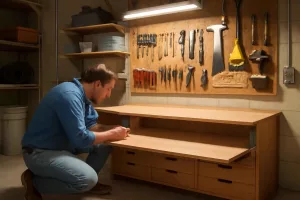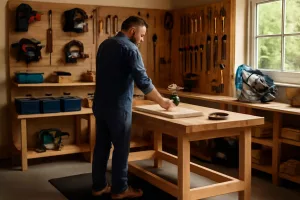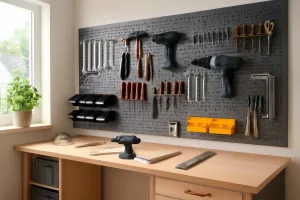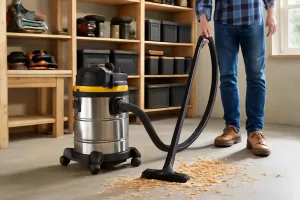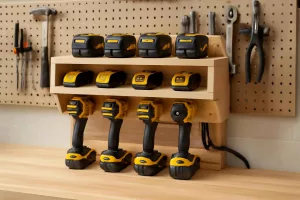Are long hours at your workbench or garage station leaving you with achy legs and back pain? Standing on hard concrete or wooden floors can cause fatigue, reduce productivity, and even lead to chronic discomfort. Investing in a high-quality anti-fatigue mat designed specifically for workshop and garage environments can transform those long sessions into more comfortable, efficient workdays. From cushioned support to slip-resistant surfaces, the right mat can alleviate pressure on your joints and promote better posture. Ready to find the perfect floor companion? Check out these top-rated options on Amazon: anti-fatigue mat.
Why You Need an Anti-Fatigue Mat in Your Workshop
Standing on hard surfaces for extended periods forces your body to work harder to maintain stability. This constant effort can lead to muscle strain, joint pain, and overall fatigue. An anti-fatigue mat is engineered to provide a cushioned layer of support, reducing the stress on your feet, knees, and lower back. Materials like rubber, foam, or gel cores absorb impact and encourage subtle movements in your calf muscles, improving circulation and minimizing discomfort.
In a workshop or garage, you may also face hazards such as oil spills, dust, and sharp debris. High-quality anti-fatigue mats often feature beveled edges to prevent tripping, non-slip surfaces to keep you steady, and durable materials that resist punctures and tears. Whether you’re sanding wood, welding metal, or assembling components, an ergonomically designed floor mat can protect your body and enhance your focus on the task at hand. Plus, reducing physical strain means fewer breaks, keeping your workflow consistent throughout the day.
Don’t overlook the safety benefits either. A well-placed anti-fatigue mat can act as a barrier against slippery floors, especially if you frequently use cleaning solvents or lubricants in your workspace. For premium cushioning and slip resistance, explore options on Amazon: workshop anti-fatigue mat.
Key Features to Look for in a Workshop Anti-Fatigue Mat
Material and Thickness
Not all anti-fatigue mats are created equal. Look for mats made from high-density foam or durable rubber compounds that maintain shape under heavy weight. A thickness between 3/4 inch and 1 inch offers optimal support without creating a tripping hazard. Thinner mats might not provide enough cushioning, while excessively thick mats can feel unstable and may catch tool cabinets or carts.
Size and Shape
Consider the footprint of your workstation. Rectangular mats are ideal for long benches, while horseshoe or U-shaped mats wrap around standing desks or machine bases. A larger surface area encourages movement, allowing you to shift positions and stretch your legs without stepping off the mat. Measure your workspace width and depth, then choose a mat that covers at least 36 inches in width and 24 inches in depth for maximum coverage.
Durability and Easy Cleaning
Workshop environments can be messy. Oil, paint, sawdust, and metal shavings are common. Choose mats with sealed surfaces that wipe clean easily or hose off outdoors. Mats labeled as chemical-resistant or heavy-duty will withstand harsh conditions longer, saving you money on replacements.
Anti-Slip and Edge Design
Safety is paramount. A textured surface prevents slips, while beveled edges reduce trip risks. Some mats feature drainage channels to guide liquids away, keeping the top surface dry. When placing multiple mats side by side, ensure the edges interlock or align flush to avoid gaps.
Top Picks for Best Anti-Fatigue Mats for Workshop and Garage
Best Overall: CUSHIONTECH Professional Grade
The CUSHIONTECH Professional Grade Mat strikes the perfect balance between comfort and durability. Constructed from high-density cross-linked foam, it offers consistent support for up to 30,000 hours of use. The beveled safety border and textured surface enhance traction, even in wet or oily conditions. Sized at 36″ x 24″ and 3/4″ thick, it fits most workbenches and standing tool stations. Users praise its resilience under heavy tool carts and frequent traffic. For more workshop organization ideas, check out the heavy-duty workbench guide.
Find this top-rated mat on Amazon: CUSHIONTECH Professional Grade.
Best Budget Option: ComfortZone Floor Mat
If you need ergonomic support without breaking the bank, the ComfortZone Floor Mat delivers. Featuring a dual-layer foam core at 3/4″ thick, it covers a 32″ x 20″ area and is backed by a slip-resistant vinyl top layer. While it may show wear faster under heavy loads, casual DIY enthusiasts will appreciate its affordability and ease of cleaning.
This mat is ideal for hobbyists setting up a compact tool cabinet area or a simple workbench. Grab it on Amazon: ComfortZone Floor Mat.
Best Heavy-Duty Mat: RhinoGard Industrial Shield
Designed for workshops handling heavy machinery, the RhinoGard Industrial Shield boasts a 1″ thick closed-cell rubber construction that resists chemicals, oils, and sharp debris. At 48″ x 36″, it provides extensive coverage, perfect for multiple tool stations or a machinist’s layout. The slip-resistant top and beveled edges ensure safety in high-traffic areas.
Pair with overhead garage ceiling storage solutions to maximize floor space. View it on Amazon: RhinoGard Industrial Shield.
Best Ergonomic Contoured Mat: ErgoLine Contour Comfort
For tasks requiring precise motion and frequent position shifts, the ErgoLine Contour Comfort Mat features a unique deltoid shape that cradles your feet while you pivot. Made from medical-grade PVC and rubber, its 7/8″ thickness supports extended welding or soldering sessions. Drainage grooves channel away spilled fluids, and the micro-textured surface prevents slippage.
Ideal for labs, assembly lines, or detailed woodworking benches, this mat enhances focus by reducing distractions from discomfort. Purchase it here: ErgoLine Contour Comfort.
How to Maintain and Care for Your Anti-Fatigue Mat
Proper cleaning extends mat life. For foam-based mats, sweep or vacuum surface debris daily. Wipe with a damp cloth and mild detergent weekly to remove stubborn grime. Rubber mats can be hosed down outdoors—allow them to air dry completely before reinstalling. Avoid harsh solvents or abrasive tools that can damage the surface.
Store spare mats flat in a cool, dry area to prevent warping. If storing vertically, support the entire length to avoid bends. Inspect mats periodically for cracks, tears, or uneven wear. Replace mats showing compromised cushioning or damaged edges to maintain safety standards.
Frequently Asked Questions about Workshop Floor Mats
Are anti-fatigue mats worth it?
Absolutely. Studies show that anti-fatigue mats reduce lower back pain, foot discomfort, and muscle fatigue by promoting micro-movements that improve blood flow. For professionals and hobbyists alike, the investment pays off through increased comfort and productivity.
Can I use an anti-fatigue mat in my garage?
Yes. Garage floors often comprise concrete that transfers cold and hardness to your body. An anti-fatigue mat specifically rated for garage conditions will resist oil, grease, and chemical spills while providing essential cushioning.
How thick should a workshop mat be?
We recommend a thickness between 3/4″ and 1″. Less than 3/4″ may feel too firm, while mats over 1″ can be unstable and pose a trip hazard. Choose thickness based on your weight, task type, and workspace layout.
Conclusion
Investing in the right anti-fatigue mat can dramatically improve comfort, safety, and productivity in your workshop or garage. From heavy-duty industrial designs to budget-friendly foam mats, options abound to suit every need and budget. Evaluate factors like material, size, edge design, and cleaning requirements to select the best anti-fatigue mat for workshop use. Ready to step into lasting comfort? Browse our top picks on Amazon and take the pressure off your daily grind.

